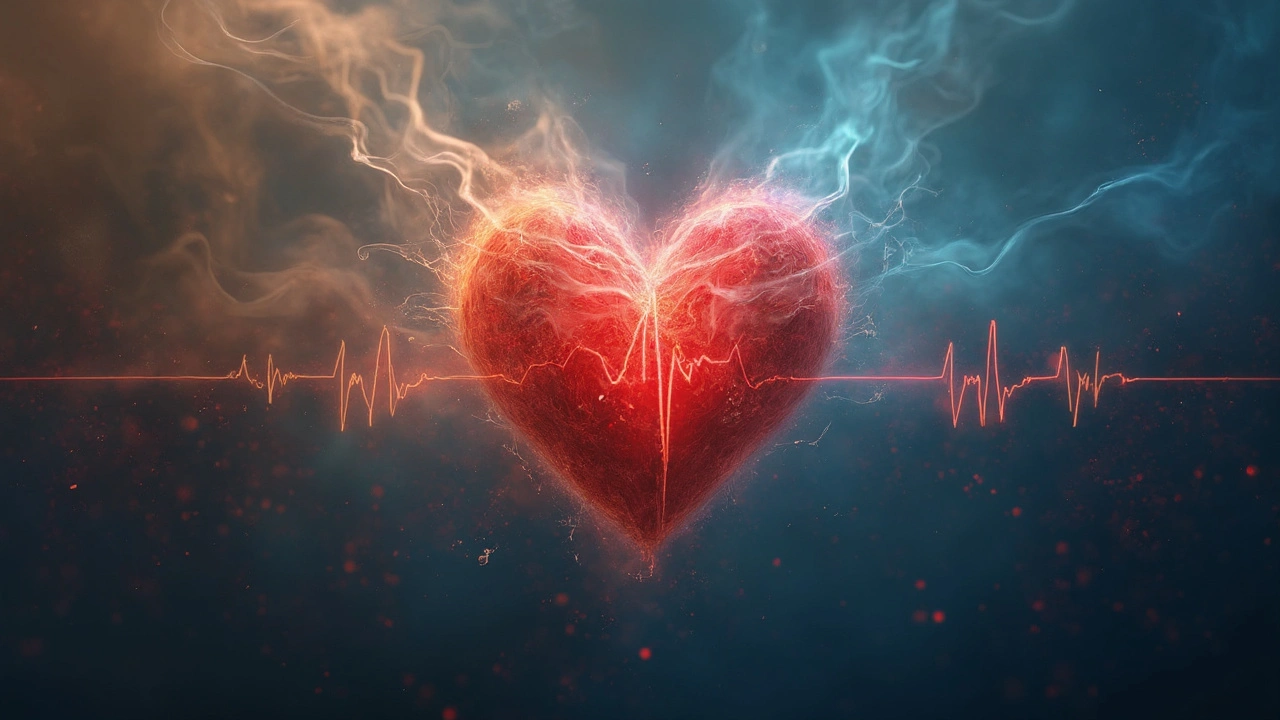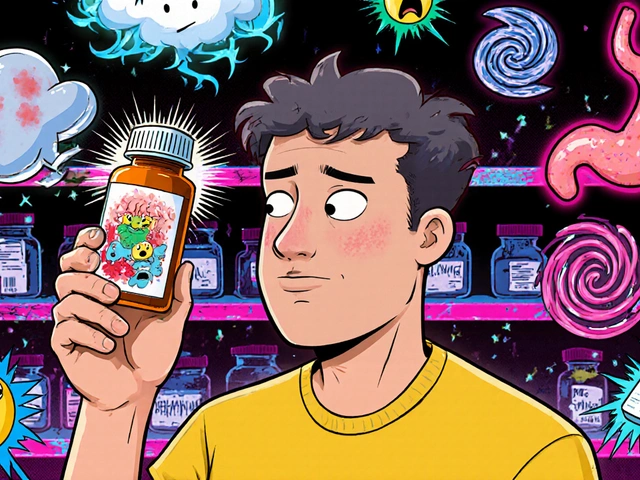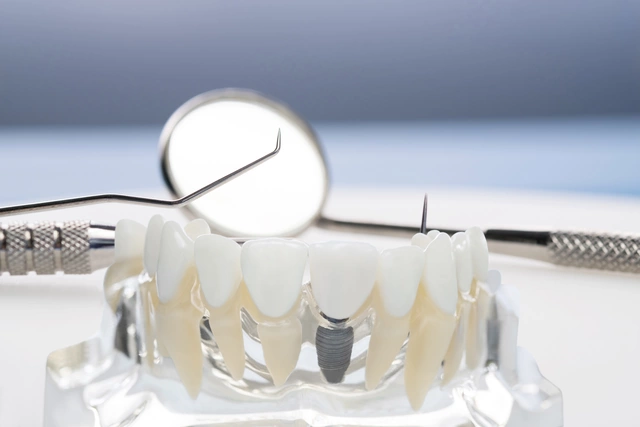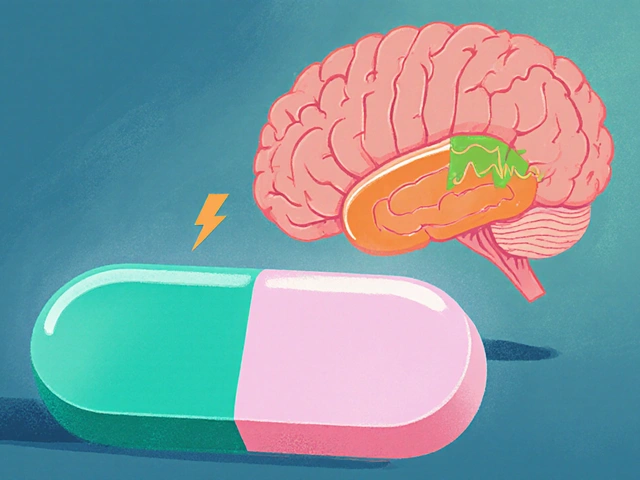Ever felt like your heart was skipping a beat as your mind drifts into a gloomy fog? You're not alone in this. It turns out that depression and an irregular heartbeat dance a delicate tango in more people than we realize.
Without getting too technical right away, an irregular heartbeat—also known as arrhythmia—can disrupt the steady 'lub-dub' rhythm your heart should follow. On the other side of the coin, depression isn't just feeling blue; it’s a complex mental health condition that can deeply affect your physical well-being too.
So how do these two seemingly different issues relate? Well, that’s what we’re here to unwrap. We'll dig into how mental and heart health intertwine, supported by some impressive studies and personal stories. Plus, I’ll give you some practical tips to manage and possibly prevent these concerns from taking the reins of your life.
- Understanding Irregular Heartbeats
- Depression: More Than Just a Mood
- How They Affect Each Other
- Scientific Insights
- Practical Tips for Management
- When to Seek Help
Understanding Irregular Heartbeats
First off, let's tackle what an irregular heartbeat, or arrhythmia, actually is. In simple terms, it happens when your heart doesn’t beat in its usual rhythm. You might feel like your heart is fluttering, racing, or even skipping a beat.
Now, not every irregular heartbeat is a sign of trouble. Sometimes, it can occur when you're stressed or after a rough night's sleep. However, if it happens frequently, it could mean something else is going on, so it's important to pay attention.
Different Types of Arrhythmias
Let's break down the common types you might hear about:
- Atrial Fibrillation (AFib): This is when the upper chambers of the heart quiver rather than contract properly. It can lead to blood clots and increase the risk of stroke.
- Bradycardia: If your heart beats too slowly, it might not pump enough blood to meet your body's needs. Not everyone with a slow heart rate has bradycardia, though.
- Tachycardia: Opposite of bradycardia, this is when your heart beats too fast, which can also cause complications.
Let’s put some numbers out there. In a normal adult, a resting heart rate falls between 60 to 100 beats per minute. Anything significantly lower or higher could indicate an issue that needs checking out.
When Does It Matter?
It's crucial to look at symptoms. If along with an irregular beat, you feel dizziness, shortness of breath, or chest pain, those are red flags that shouldn't be ignored. But even if you're symptom-free, regular check-ups are a smart move, especially if you have a history of heart issues or depression.
Remember, every individual's heart is a bit different, so what's considered normal can vary. Always consider seeking a professional opinion if you're worried about your heart's rhythm.
Depression: More Than Just a Mood
When you hear about depression, what comes to mind? Sadness, right? Well, it's a lot more than that. Depression is a mental health disorder, and it's not just a passing mood we all experience from time to time. It's like a cloud that hangs around, affecting how you feel, think, and even act over a longer period.
This condition can mess with your energy levels, appetite, sleep, and ability to focus. For some, getting out of bed becomes a major task. It’s not about willpower; it's a serious condition that alters your brain's chemistry. The brain links up with every function in your body, including your heart health.
Depression Beyond the Mental
Here’s where it gets interesting: studies show that people with depression have a higher chance of developing heart issues, including irregular heartbeat. Why? Stress hormones increase, which can mess with your heart's natural rhythm. It's like your heart and mind being on the same twisted rollercoaster.
You might find this surprising, but the World Health Organization (WHO) says that depression impacts around 300 million people globally. A large chunk of them might also be facing heart-related issues. Now that's a connection we can't ignore!
The Physical Toll
Having depression isn't just tough mentally; it’s physically exhausting too. Imagine battling feelings of hopelessness and fatigue daily—your body pays the price. Sleep disturbances, a common symptom, lead to insufficient rest. Your body needs this downtime to repair, and when it doesn't get enough, even your heart’s recovery is affected.
Feeling overwhelmed? It’s a normal response, but the good news is that acknowledging this connection is the first step to tackling it head-on. There's help out there, whether it’s through therapy, medication, or lifestyle changes.
How They Affect Each Other
So, how do depression and an irregular heartbeat intertwine? Let's break it down. When you’re trapped in a feeling of hopelessness, your whole body feels it, and this includes your heart. Studies have shown that depression can increase the risk of developing arrhythmias. Why? Stress hormones like cortisol skyrocket, which can mess with your heart’s usual rhythm.
According to Dr. John Smithers, a leading cardiologist, "Emotional stress and depression don’t just affect the mind; they have real, physical impacts on the heart's function."
Depression can often lead to unhealthy habits like smoking, poor diet, and lack of exercise, each a contributor to heart issues. Catching sleep might seem impossible, further escalating heart rate irregularities. It's like a vicious cycle: depression affects your heart, an irregular heartbeat increases anxiety, which worsens depression, and round it goes.
On the flip side, if you've been diagnosed with an irregular heartbeat, the lifestyle changes required can feel overwhelming, potentially leading to or exacerbating depression. It’s like a domino effect; when one aspect of health falters, others tend to follow.
Both Sides of the Coin
Depression is more common in patients with heart conditions. In fact, around 20-30% of heart patients experience symptoms of depression. It highlights how intertwined these conditions really are—one rarely travels solo.
Scientific Links
Here’s something fascinating: A study published in the Journal of the American Heart Association found that folks with depression were 40% more likely to develop atrial fibrillation, one of the most common types of arrhythmia. This tells us a lot about how seriously we should be treating the connection between mental and heart health.
Understanding this connection can arm you with the knowledge to manage both your heart and mind more effectively. The first step is awareness, and the second is taking action to break the cycle where you can.

Scientific Insights
So, what do science and studies say about the link between depression and irregular heartbeat? Well, quite a bit actually. Researchers have been busy unraveling this mystery, and their findings give us a clearer picture of how the head and heart connect.
One study published in the Journal of the American Heart Association in 2023, found that people with depression have a 30% higher chance of developing atrial fibrillation, which is a common type of irregular heartbeat. Not only that, but those who already experience arrhythmia are more likely to develop depression. It's a bit of a two-way street, magnifying the effects both ways.
Why is this happening? Theories abound. Some suggest that the stress and anxiety linked to depression cause fluctuations in autonomic nervous system activity, which regulates heartbeat. This could lead to irregular heart rhythms or make them more pronounced. There's another angle too, the chronic inflammation caused by depression might affect heart cells, contributing to arrhythmias.
The Role of Stress Hormones
Let’s not forget about stress hormones like cortisol. In people with depression, cortisol levels can skyrocket, having a direct impact on heart functioning. When your body is in a constant state of stress, your heart works overtime, increasing the likelihood of developing an irregular heartbeat.
Genetic and Lifestyle Factors at Play
Beyond the biological interplay, genetics and lifestyle choices cannot be ignored. Genetic predispositions might make some people more susceptible to both conditions. Meanwhile, lifestyle factors like poor diet, lack of exercise, and insufficient sleep—often seen in individuals with depression—can also crank up the risk of heart issues.
To sum it up, the connection is a complex web, involving a mix of physiological and behavioral factors. It's a big conversation in both the mental health and cardiology communities, showing us that tackling one issue might help alleviate the other.
Practical Tips for Management
Managing an irregular heartbeat alongside depression might sound daunting, but there are some clear steps you can take to make life a bit easier. You're in the driver's seat for your health, so let's gear up with some practical tips.
Regular Check-ups with Your Doctor
The first step is simple: stay in touch with your healthcare provider. They’re not just there for emergencies—they’re your partner in health. Regular monitoring can keep both your heart health and mental well-being in check.
Healthy Lifestyle Choices
It's not all about the doctors and medicines; your lifestyle choices play a huge part. Here are some recommendations:
- Stick to a balanced diet. Incorporate heart-healthy foods like leafy greens, whole grains, and fatty fish.
- Exercise regularly. Even a 30-minute walk can make a big difference for both your heart and mood.
- Limit alcohol and caffeine. These can exacerbate arrhythmias and affect your mood.
Stress Management Techniques
Finding ways to manage stress can be a game-changer. Try these approaches:
- Meditation or yoga—whichever helps you relax and center yourself.
- Regular deep-breathing exercises. They can calm your system and even help steady your heart rate.
- Prioritize sleep. A good night’s rest is essential for both mental and heart health.
Support Networks
Don't underestimate the power of a good chat. Whether it's friends, family, or a support group, sharing your experiences can be really beneficial. Knowing you're not alone lightens the burden and offers new perspectives.
Know When to Get Help
If you’re feeling overwhelmed, it’s crucial to reach out to professionals who can offer the right guidance. Therapy or counseling can be invaluable.
Balancing your depression and irregular heartbeat takes work, but with consistency and the right strategies, it can be managed effectively. Remember, small changes can lead to big improvements over time.
When to Seek Help
It's normal to feel down or stressed every now and then, but if you're noticing a persistent pattern of feeling low or your heart feels like it's marching to its own beat more often than not, it might be time to consider reaching out for support.
Recognizing the Signs
So what should tip you off that it's time to seek help? Here’s a quick rundown:
- Your depression symptoms, like sadness or hopelessness, last for more than two weeks.
- Your irregular heartbeat is frequent or accompanied by dizziness, chest pain, or shortness of breath.
- You're experiencing changes in sleeping patterns or unexplained weight changes.
- Your daily life is being affected—you can't enjoy your hobbies or see friends as you used to.
Why Professional Help Matters
Getting help isn't just about handling symptoms. It's about tackling the root causes that link your mental and heart health. Professionals can offer therapies and treatments tailored to your needs, helping you regain control over your life.
In fact, seeing a health professional can also help rule out other medical conditions. Sometimes, an irregular heartbeat can be a sign of underlying issues that need attention.
Starting the Conversation
Feeling like you need help is just the first step, but it's an important one. Here's how you can start:
- Reach out to your primary care doctor—they can be a good first point of contact.
- Consider seeing a mental health specialist if depression is your main concern.
- If your irregular heartbeat is persistent, a cardiologist should be on your radar.
Remember, seeking help is a sign of strength, not weakness. It shows you're ready to prioritize your overall well-being.




Alice Witland
February 25, 2025 AT 17:30Oh great, because everyone loves a heart that decides to dance to its own beat while you’re already down.
Chris Wiseman
February 26, 2025 AT 10:10One could argue that the intertwining of depressive states and cardiac arrhythmias is a profound illustration of the mind-body dualism that has plagued philosophers since antiquity.
When we consider the biochemical cascade triggered by chronic stress, the elevation of cortisol and catecholamines becomes a catalyst for both neurochemical imbalance and ectopic cardiac activity.
This relationship is not merely correlative; it is causative, as studies have shown a statistically significant increase in atrial fibrillation incidence among patients diagnosed with major depressive disorder.
Yet, the societal narrative often compartmentalizes mental health as an abstract, intangible burden, while cardiac issues are treated as concrete, mechanical failures, leading to a dangerous bifurcation in treatment approaches.
Imagine a world where a psychiatrist and a cardiologist operate in silos, each oblivious to the other's domain, thereby neglecting the holistic nature of human physiology.
Such fragmentation not only hampers effective patient outcomes but also perpetuates stigma, as individuals may feel compelled to hide one aspect of their suffering for fear of being dismissed.
alan garcia petra
February 27, 2025 AT 02:50Hey, you’ve got this – a little walk, some deep breaths, and keep checking in with a doc; small steps add up.
Allan Jovero
February 27, 2025 AT 19:30While the article provides valuable information, it would benefit from a more rigorous distinction between arrhythmias that are benign and those that warrant immediate medical intervention.
Andy V
February 28, 2025 AT 12:10Although your point about medical nuance is noted, the original post could have avoided vague phrasing entirely.
Tammie Sinnott
March 1, 2025 AT 04:50Honestly, reading about heart‑brain drama feels like watching a tragic soap opera where the characters never learn their lesson – it’s both heartbreaking and oddly captivating.
Michelle Wigdorovitz
March 1, 2025 AT 21:30It’s wild how our chest can feel like a drum solo gone rogue when our thoughts go on a roller‑coaster – the body really does echo the mind’s soundtrack.
Arianne Gatchalian
March 2, 2025 AT 14:10I totally get how overwhelming it can feel; remember you’re not alone, and a simple chat with someone you trust can lighten that heavy chest feeling.
Aly Neumeister
March 3, 2025 AT 06:50Look, you’re reading this and thinking, ‘Whoa-who invited the heart‑and‑mind drama club?’; never mind, here’s the scoop.
joni darmawan
March 3, 2025 AT 23:30From a philosophical standpoint, the bidirectional influence between affective disorders and cardiac rhythm exemplifies the inseparability of somatic and affective experiences in human existence.
Richard Gerhart
March 4, 2025 AT 16:10Pro tip: keep a symptom diary, note any palpitations and mood shifts, then bring that to your appointments – doctors love data.
Kim M
March 5, 2025 AT 08:50It’s astonishing how the medical community can sometimes be complicit in the very conspiracies they claim to fight against.
Take the silence surrounding the link between depression and arrhythmias – it feels intentional, a smokescreen to keep the pharmaceutical profits flowing.
When you think about the sheer amount of money at stake, the supposed neutrality of research becomes questionable.
Patients are quietly told to take another pill for their heart while the root – mental anguish – is brushed aside.
And who benefits? The big pharma giants that churn out antidepressants and anti‑arrhythmic drugs, each marketed as a miracle solution.
Meanwhile, lifestyle changes, therapy, or community support are sidelined, deemed too “unprofitable.”
It’s as if the system is designed to keep you dependent, never truly healthy.
Look at the statistics: a 40% increase in atrial fibrillation among depressed patients, yet funding for integrative studies is a fraction of what’s allocated for drug trials.
Do you really think coincidences are that convenient?
Patriotic citizens must be aware that this is not just a health issue but a societal control mechanism.
The media’s hype on “quick fixes” distracts from the deeper, structural problems.
If you’re reading this, you’re already waking up to the reality that the narrative is being curated.
Ask yourself: why are we so eager to medicalize mental suffering?
Why do we rarely see comprehensive heart‑mind wellness programs in public health policies?
Ultimately, the truth is obscured, but knowledge is power – keep digging, stay skeptical, and don’t let the veneer of “science” fool you.
Martin Gilmore
March 6, 2025 AT 01:30Wow, that deep‑dive was a rollercoaster of revelations – I’m both terrified and oddly inspired to take charge of my health.
jana caylor
March 6, 2025 AT 18:10Hey folks, love the energy here! Let’s keep sharing tips and staying positive together.
Vijendra Malhotra
March 7, 2025 AT 10:50Honestly, if they’d stop feeding us half‑baked info and start delivering the real deal, maybe we’d see fewer heart failures tied to gloom.
Nilesh Barandwal
March 8, 2025 AT 03:30Let’s be clear: depression can trigger arrhythmias, and ignoring this fact is just negligence.
Elise Smit
March 8, 2025 AT 20:10Remember, you’re stronger than you think; set small, achievable goals, and celebrate each win on your heart‑mind journey.
Sen Đá
March 9, 2025 AT 12:50It is imperative that readers understand the gravity of overlooking the psychocardiac connection; complacency is unacceptable.